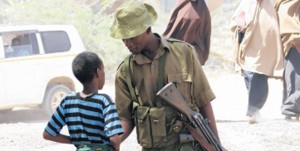By MUCHEMI WACHIRA
 North eastern Kenya residents curse their proximity to Jubaland, a newly-created state in southern Somalia.
North eastern Kenya residents curse their proximity to Jubaland, a newly-created state in southern Somalia.
Jubaland’s eastern border lies 40–60 kilometres east of the Jubba River, stretching from Gedo to the Indian Ocean, while its western side neighbours north eastern Kenya.
While most of it is currently under the control of a new government Kenya helped to form, its Gedo region, which borders Mandera and Ethiopia, is ruled by terror group Al-Shabaab.
The militants have made life difficult for travellers using the Lafey-Fino-Mandera road.
This is the route most transporters to Mandera Town or Garissa and Wajir prefer. The alternative is Elwak-Rhamu-Mandera road, which is not only bumpy but longer.
Currently, the militants ambush travellers on the 67-kilometre stretch between Arabia and Mandera Town almost at will.
This writer and his team used the route last week while on a fact-finding mission in North Eastern region.
We left Garissa early in the morning hoping to reach Mandera, 600 kilometres away, the same day.
At one of the many roadblocks, a few kilometres to Arabia, a police officer warned us that the road was not safe. He did not give details.
But there are others who said security was assured with the presence of Kenya Defence Forces personnel patrolling the border. We proceeded with the journey.
We reached Arabia at 8pm, stopping at a roadblock near an Administration Police post. A police officer cautioned that it was risky to drive on the stretch between Arabia and Mandera Town.
The previous day, the officer told us, two vehicles that had off-loaded miraa (khat) in Mandera from Maua in Meru County were carjacked by Al-Shabaab bandits.
Although they did not harm the drivers and their crew, they stole their four-wheel vehicles, which they use to carry out their military activities.
The officer’s next words were terrifying: “The Al-Shabaab have sent word that they are coming to attack our camp tonight, which they have done previously. So I would advise you to consider spending the night here.”
Arabia is a trading centre with no lodgings.
Before we could make up our minds, the officer warned us: “But if you want to proceed, I will only take the registration number of your vehicle and your ID card numbers. Don’t blame anyone for whatever happens to you on the way.”
He advised us to spend the night at their camp as security outside was not guaranteed.
There we found the officers in dugouts or bunkers preparing for an attack as others guarded the gates.
“We don’t sleep in our houses but prefer bunkers as Al-Shabaab militants can attack the camp any time,” an officer quipped as he showed us where to park our vehicle.
Battle field
Another officer ushered us inside a tent after ordering his juniors to spread mattresses for us. This was after we introduced ourselves.
“This is a battle field and any time Al-Shabaab will strike. So go into the tent and don’t wake up unless you are answering a call of nature. But once you hear gun-shots please stay inside or you may die in the fighting,” he said.
Despite the travelling fatigue, we did not sleep , fearing an attack.
At 8am, the locals also started trickling in with their livestock.
We left the camp when the Administration Police officers assured us that the road was safe.
The road is, however, secure from Garissa to Wajir and parts of Mandera where Kenya neighbours Jubaland.
The Al-Shabaab militias were driven out of this new state by the Kenya Defence Forces while liberating Kismayu in Somalia.
Source: Daily Nation


Leave a Reply